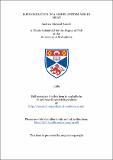Lipid oxidation in a model system and in meat
Abstract
Lipid oxidation is the main factor which limits the shelf-life of meat when held under frozen storage. Research undertaken used pork phospholipid liposomes as a model for studying lipid oxidation in meat. Oxidation was followed by monitoring the decrease in the phospholipid unsaturated fatty acyl chains. It was found that the greater the level of unsaturation of the phospholipid fatty acyl chain the greater was their susceptibility to peroxidation. However, the results were not consistent and several reasons for the variation in rate are provided. At ambient temperatures copper (II) was found to be pro-oxidant in the peroxidation of liposomes. At temperatures below 0°C the prooxidant activity of copper (II) was significantly reduced. However copper again became highly pro-oxidant if sodium chloride was present. It is suggested that salt controls the copper ion concentration at sub-zero temperatures as the pro-oxidant activity of copper (II) is reduced on increasing the copper (II) concentration from 0.9 to 90 ppm. Other experiments found sodium nitrite and pholyphosphate to act as antioxidant and that liposome structure was an important factor in the rate of peroxidation. Four storage trials on pork burgers were undertaken to determine whether salt was also pro-oxidant in the stability of pork when held under frozen storage. The oxidative deterioration of the meat was followed by the following methods of analysis:- 1. The decrease in the unsaturated acyl chains of both total lipid and phospholipid. 2. The change in the colour parameters of the meat using reflectance spectroscopy. 3. The analysis of neutral lipid oxidation products by HPLC. 4. The organoleptic qualities of the pork using a trained panel of food assessors. The results from these storage trails showed that the deterioration of pork was minimised by storing the burgers at lower temperatures within the range 0 to -30°C. Salt was found to accelerate the oxidative deterioration of both uncooked and cooked pork when stored at -20°C. Nitrite was found to exhibit some antioxidant behaviour and reduce the pro-oxidant effect of salt.
Type
Thesis, PhD Doctor of Philosophy
Collections
Items in the St Andrews Research Repository are protected by copyright, with all rights reserved, unless otherwise indicated.

